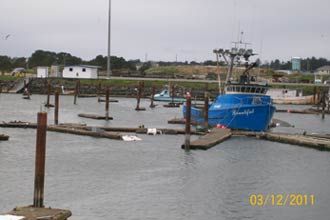By Sgt. Barry Evert
CRESCENT CITY, Calif. -- For most of us, the news that a serious Tsunami could threaten our nation’s west coast was not huge news. The expected wave of 6 feet was hardly enough to do any real damage, right?
The exception is the small town of Crescent City, California. Crescent City, especially the harbor, is shaped uniquely, and faced in the direction that leaves it extremely vulnerable to Tsunamis. In 1964 the entire town was nearly destroyed when a 20 foot wave swept through the city, taking many structures with it. The shape and location of the harbor tends to amplify Tsunamis, so the concern here was high.
Tsunamis are a fact of life, especially here in Crescent City. So much so that even our youngest citizens are trained in what to do during a Tsunami. At about 5 a.m. this morning my youngest son, 10 years old, was knocking at my bedroom door. As I woke up I could hear the Tsunami sirens in the background. My youngest has a habit of listening to the radio in the morning, and was happy to announce that school was cancelled due to a Tsunami threat to the city. My wife and I both jumped up, as we are only about a mile from the beach.
We listened to our local radio who advised that we were facing a Tsunami wave of up to 7 feet. I immediately jumped to Google earth and checked our elevation, only to find that we were well above the flood prediction. Even so, our preparations went into effect immediately. We filled the bathtub with fresh water, and made sure our valuables were high in our two story home. We always have a steady food supply, so were not concerned about rallying to the store for supplies.
The sound of the Tsunami sirens were chilling. They reminded me of the air raid alarms I heard growing up in the low lands of Europe. Although they were never warning of a real air-raid, the dark cloud of possibility was always over us. Small explosions could be heard in the distance, presumably an attempt to wake up those in the evacuation area. More than a third of our small town were forced into shelters, and at the time of writing, are still there.
I am on vacation from my work at Pelican Bay, so getting to work was not a concern. I was ready to answer the call should it be needed, but as of 4 p.m. here, it has not come. By 8 a.m. the waves were coming. We could hear the fog horn blaring in the background, barely audible over the sound of the Tsunami sirens. We moved the family upstairs and waited. Luckily, the waves never came to us.
Our local harbor has been destroyed. At least 35 boats have been crushed, and all of our docks are history. There was some local flooding near our harbor, but nothing that has destroyed any structures. Most of the damage was caused by the surges. The water ebbing and receding from the harbor have destroyed the docks, and sunk many of the boats. Most of the docks and boats in the harbor, are now afloat in the Pacific.
My prison took the ordinary precautions, but due to security restrictions, I cannot get into our procedures for this situation. Rest assured that the public was never at risk though, as this is part of living in this area, a fact that is not lost on prison officials.
So many times I have preached the significance of being ready for a natural disaster or local emergency. How would you react if you were awoken to impending Armageddon? Keenly aware of the dangers of living in this area, I ran all the scenarios in my mind. What would I do if the worst happened? My family of course would come first, but I knew that eventually I would have to answer a call for community -assistance. This time it was a no-go, but was I really ready? Are you?
We are all alive and well here as of now, and we pray for all of those in Japan, and all of our local fisherman that have lost their livelihood. Be safe out there, and watch your 6.
| Many of the boats in the harbor were tossed together, causing much damage. |
 |
| The remains of what were once bustling docks. |











